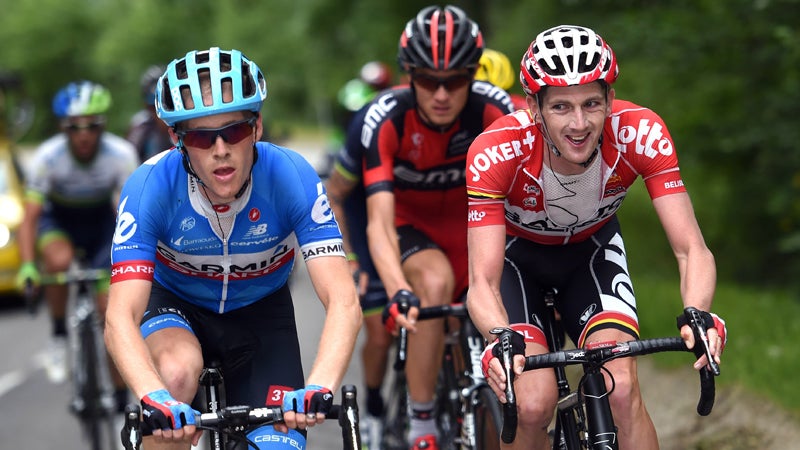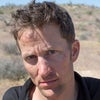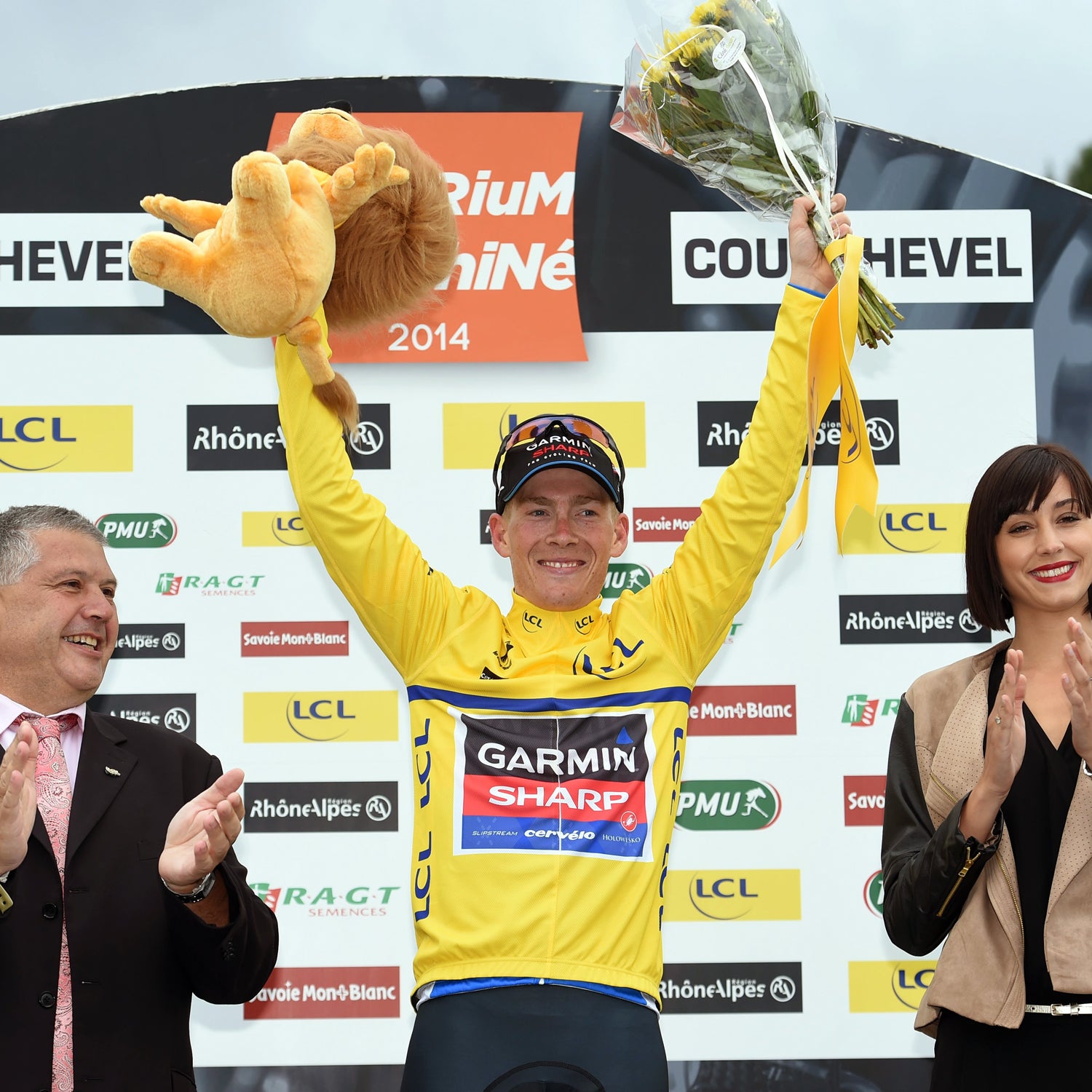It’s a rare cyclist, who, at age 25 and only his second appearance in the Tour de France, can enter the world’s biggest bike race as a dedicated leader.
But that’s just the situation Andrew Talansky will line up to Saturday in . Garmin-Sharp announced its Tour roster earlier this week, and the team is built explicitly around Talansky’s GC ambitions.
The young American isn’t as showy as some of his up-and-coming peers, but he has quietly established himself as one of the world’s most promising American stage racers. Last year, he finished 10th in his Tour debut.
And last month, he demonstrated he’s ready for more by snatching the win at the Critérium du Dauphiné, considered the ultimate Tour tune-up, from both Chris Froome and Alberto Contador. The only other Americans to have ever won the Dauphiné were Tyler Hamilton in 2000 and Greg Lemond in 1983.
Talansky is demure about his chances of repeating that success in France—he’s still young, learning. But after the Dauphiné, Froome and Contador are sure to be watching him. And so should you.
We caught up with Talanksy at his European home in Girona, Spain, late last week as he made his final Tour preparations. With composure that belies his age and an easygoing enthusiasm that’s catching, he brushed off prognostications with a smile and said he was simply eager to race.

OUTSIDE: You targeted a win at Romandie but ended up 11th. What happened?
TALANSKY: Going into that race, I was more fit than I’ve ever been in my life. Numbers wise, fitness wise, I was ready to be on the podium. But that’s the beautiful part of this sport: it’s not run in a lab.
I was in good position early and right there with Chris Froome and Simon Spilak at the most critical moment on the final climb on Stage 3. Then my chain came off. I spent a bunch of time trying to fix it and pretty much lost all shot at the GC. Then a few days later at the time trial, I had some stomach issues. I was vomiting from the bike at 60 miles per hour on the downhill.
It’s frustrating, you put in the work and think you’re ready and then somehow because of things out of your control, it just doesn’t line up. But the work that I put in for that race is still paying off.
Did you go into the Dauphiné thinking that you could win?
Honestly, no. I knew where my fitness was at the start. I knew I was good and that I was there to get even better for the Tour. Barring anything going wrong, like in Romandie, I figured I could be in the top 10.
And if everything went perfectly, I thought I could be top five. But I never really imagined that I would win it. Alberto Contador was the strongest guy in that race, no question. But that’s the thing about cycling, the strongest guy on paper doesn’t always necessarily win.
After Stage 2 of the Dauphiné, you said, “Contador and Froome are on another level. It’s their race, we are along for the ride essentially.” But that’s not the way it played out. What lessons do you take away?
I didn’t mean that in a defeatist way at all. I meant it in a respectful and realistic way. I think it is important to be realistic about where you are in your sport, and I am 25 and still young in terms of results.
Froome is 29, and when he is at 100 percent, he is a Tour de France winner. Contador is in his 30s, and he’s won all three grand tours. To just go out and say you are going to beat those guys, it’s not realistic. That didn’t mean that I wasn’t going to try and race them. It didn’t mean I wouldn’t take the opportunities when they came.
On the , when Contador finally chased, you opened up a wider gap to him on the last climb. Does that give you confidence?
It was absolutely a complete confidence boost. Contador spent a lot of energy chasing alone on the penultimate climb while Ryder was doing all the work for me. So it’s maybe not an exact comparison. But yes, it does give me a lot of confidence to know that I can climb with Contador and Froome and to have opened a bit more time on Contador on that climb.
I saw that even on Saturday, when it was more of a traditional day. Contador was up the road, and Richie Porte went to the front to pull for Froome. Right away, everyone began losing contact. In the end, I was the only rider who was still there.
My climbing level has progressed significantly in the last two years. It confirms the training I’ve been putting in and the work I’ve been doing. And it gives you confidence. If you can do it once, you know you can do it again. Now, can I do it this year late in a three-week stage race? I don’t know. We’ll have to wait and see how my body adapts. But I definitely learned in the Dauphiné that I can be right there.
Does this year’s Tour route suit you better or worse than 2013?
I honestly don’t know. It’s only my second Tour, and it’s quite a bit different than last year. The Pyrenees come in the last week, which is maybe not so good for me. I do better on the longer steadier climbs of the Alps, but then again maybe having the Pyrenees late will balance things out.
And there’s only one time trial, but it’s quite long and quite difficult and it’s on the last day. I tend to hold up well over three weeks. So I’m really looking forward to that time trial. Overall, I think all of the differences are good for me. In just two years, I am going to get to see two very different Tour de Frances, and we’ll hopefully find out which type is better for me.
I know that my training is better this year, and that I’m arriving at the start better prepared. So all I can do is show up and see how it plays out.
Are there stages that you’re worried about, maybe the ones in England where most people are expecting bad weather or the cobbles on stage five?
Honestly, I’m looking forward to all of it. Every day out there is a battle. Over three weeks it’s a war, but you have to go out each and every day ready to do battle. And I try not to worry about it. I don’t think there’s anything to be afraid of. I’ve seen the stages. I know what to expect.
And it’s the same for every GC contender. We all have to ride in the wet if it rains, and we all have to ride the cobbles. It’s just the way it is. The only choice you have is how you choose to approach it. And what I’ve seen is that when you approach each stage with an attacking attitude rather than just trying not to lose time, you usually come out better. So I try to go into every stage excited and eager because I think the worrying and being afraid will just set you back.
Obviously it’s going to be stressful. But it doesn’t matter what terrain they ran it on. It could be totally flat and dry, and it would still be stressful. It’s the Tour de France, the biggest bike race in the world. It’s always going to be stressful.
Do you worry that winning the Dauphiné will make it harder for you to get a good result in France?
I don’t think it will have any impact on the result I’ll have in France. My goal is to improve on the result I had last year, which was 10th place. Something like Dauphiné was a one-time occurrence. Froome and Contador were looking at each other and calling each other’s bluff.
But they weren’t necessarily there to win the Dauphiné. The two of them are both completely focused on the Tour de France, so I can’t really see the same thing happening at the Tour. You’re not going to get a scenario where those two let anyone build up a big lead.
Everyone talks about the new, cleaner cycling, but there’s still doping controversy, like Ulissi’s positive at the Giro and Froome’s Therapeutic Use Exemption (TUE). Do you believe your competition is clean?
I do, absolutely. That’s just my personal belief, but it’s based on what I’ve seen. I am riding clean, obviously, and I look at the guys that are better than me, and what they’re doing doesn’t seem impossible.
When I was getting dropped as a neo-pro, I said, “Sure, maybe I can’t do now what the best guys are doing. But I feel like I will be able to do it some day.” Some people told me that was naïve, but now I’ve won the Dauphiné, and I’m closer, which is just confirmation of what I thought. The performances I see aren’t unrealistic relative to my own riding.
You’re always going to have the exceptions. You’re always going to have somebody who tries to get an unfair advantage. It’s the same in school, in the stock market. Some people will always try to find the easy way out, the magic bullet. But I think the best guys in the sport now know that there are no shortcuts that are going to last. I completely believe that the only way to win today is to ride clean and do the work. And I think the vast majority of racers take the same approach.
Do you think you can win the Tour de France?
Obviously that’s the dream. When you come into this sport as a young rider, you dream of the Tour de France. It’s the ultimate expression and goal in cycling. So I still dream of winning it someday. Whether that becomes a realistic goal, I don’t know.
I think that it’s realistic to believe that I can compete for the podium. Right now I can see a path to get me there in the next few years. I feel that I have the right mix of strengths and abilities to be up there.
Now, whether it’s going to take the right course, whether we have to wait some years for me to develop, whether I just have to have some luck and everything comes together…there are a lot of factors. And honestly, I have to just keep working and see how I grow and learn to find out how far I can take this. But yes, the dream is still to win the Tour one day.
So if not you this year, Chris Froome or Alberto Contador?
I couldn’t tell you. I can tell you that having seen the way Chris Froome rode last year, if he shows up at 100 percent, I don’t think there’s a person in the world who can beat him.
But Alberto Contador is a bike racer. He’s a competitor. He knows when to attack, and he likes to put people under pressure. He’ll attack on the uphills, the downhills, anywhere. His racing is almost the opposite style of Sky’s, and he knows how to create advantages. So either way, it should make for an exciting race in July. But I couldn’t put my money on one over the other.
What’s on your schedule after the Tour?
It really depends on how the Tour goes. I didn’t have the best training coming into the Tour last year, and I was honestly just tired the rest of the season. I think it took me even into the winter to completely recover from it. But this is my second Tour, my third grand tour, so ideally I can recover better and faster this year and still maybe post up some good results later in the year.


